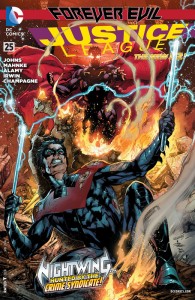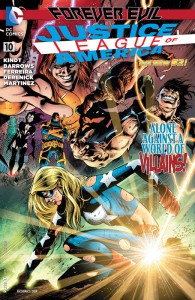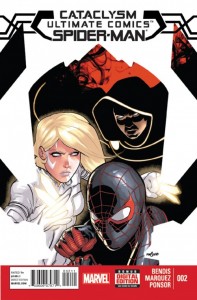 Editor’s Note: It’s The End Of The World As We Know It, And I Feel Spoiled.
Editor’s Note: It’s The End Of The World As We Know It, And I Feel Spoiled.
So between spending the week helping the new cat get used to a life where the searing agony of a shot to the nuts happens to stupid humans, and dealing with the first ice and snow falls of the winter (Three times in eight days! I love New England! And I am apparently alone in this affection, since clearly God has forsaken us!), so I am well behind in reading this week’s comics. You’d be surprised how hard it is to concentrate on a simple piece of graphic literature when the cat is yowling and my co-Editor Amanda is asking if I think it would help if she plunked his sack in a snowbank.
It’s hard being a parent, even to a lower beast who shits in a box, loves the taste of network cable, and thinks a laser pointer is the best thing ever despite not being a seven-year-old boy in 1977. So I found it interesting that the first three books I peeled off my stack this evening – Justice League #25, Justice League of America #10 and Cataclysm: Ultimate Comics Spider-Man #2 – all were about, on some level, the relationships between heroes (or anti-heroes) and their parents.
And all three books range from pretty good to excellent, but while I would normally review each of them in depth, well, it is Monday, and to compose my usual type of review for each comic would take me three hours and about 1,200 words to review, meaning there is no way in hell I could get them done before the new comics drop on Wednesday. So for a change, I’ll just write a couple of paragraphs about each, in ascending order of my opinion of them.
Assuming, of course, that this cat doesn’t decide to use my leg to sharpen his claws to remind me that I should be spending my money on scratching posts rather than silly things like neutering. Or comic books.
Justice League #25, a part of DC’s Forever Evil crossover, focuses on Owlman, his origin, and finally reveals his personal interest in the main DC Universe’s Nightwing, with a short interlude where Owlman creates Plastic Man. Owlman’s origin is pretty intriguing, with Owlman as a child working with Alfred to whack out a truly reprehensible alternate universe version of Thomas and Martha Wayne (the idea of Thomas Wayne as a man frittering away the family fortune on legal payoffs to patients he intentionally mutilated is interesting, although if the DCU’s version of Gotham is loaded with ready-made homeless and hooker victims, I doubt that the Crime Syndicate’s Gotham was instead packed with no-kill puppy shelter workers with legal representation).
The meat of the story is in Owlman’s attempt to convince Nightwing to join him in trying to take out Ultraman so that Owlman can take over Earth in his stead. And where writer Geoff Johns does a pretty decent job showing Owlman’s origin as the most evil member of a family of defective bastards, his motivations with regards to Dick Grayson are not nearly as well filled in. The Evil Alfred voiceovers that Owlman’s motivation is to fix broken families… but that directly contradicts his origin where he has his own broken family killed. Further, it contradicts his willingness to take out Ultraman, the head of his surrogate Crime Syndicate family. So what we wind up with is a pretty affecting origin for Owlman, followed by a bunch of actions that pretty much contradict the motivations behind those actions. It’s like watching that kid in college who said that Alcoholics Anonymous saved his life, all while ripping off a bong and searching for his car keys; he might be telling a good story, but it’s buried under the cognitive dissonance of his busted-out reality.
Plus, Forever Evil has been going on for a couple of months now, and I miss Batman.
 Justice League of America #10 give us Stargirl’s origin, which was far less violent and dark than Owlman’s, with the exception of the fact that, since Geoff Johns didn’t write it and Jack Knight wasn’t a part of it, I am considering laying hands on people. Anyhoo, Stargirl has mind-melded with The Martian Manhunter as they try to escape the mental and physical prison that the Crime Syndicate has trapped them in, with Stargirl vacillating wildly between her past and origin, and her present where Blockbuster, Deathstroke and Shadowthief are trying to kill her.
Justice League of America #10 give us Stargirl’s origin, which was far less violent and dark than Owlman’s, with the exception of the fact that, since Geoff Johns didn’t write it and Jack Knight wasn’t a part of it, I am considering laying hands on people. Anyhoo, Stargirl has mind-melded with The Martian Manhunter as they try to escape the mental and physical prison that the Crime Syndicate has trapped them in, with Stargirl vacillating wildly between her past and origin, and her present where Blockbuster, Deathstroke and Shadowthief are trying to kill her.
Here, it’s the origin that’s kinda problematic. We see Courtney deciding to become a hero and venturing out on her own, beyond the advice of her stepfather (who she wants to use the Cosmic Rod and Flight Belt to “stick it to”) and her mother… all while saying she wants to do the right thing. Which is a strange mix, but it worked for me; after months of seeing Stargirl as simply a pure and good person trying to do the right thing, a little pettiness at her core made her feel a little more human to me. And while it’s been a while, I can remember being a teenager and feeling like the adults trying to tell me what to do didn’t know shit, so that characterization worked for me. But I wish there was more here to show the parts of Courtney’s upbringing that showed us why she wants to do the right thing; what we were presented with showed us more of an obstinate teenager more interested in bucking the rules and sticking it to the man than in doing the “right thing”. And maybe there’s more writer Matt Kindt will show us about her relationship with her mom and stepfather that will fill that in in future issue, but in this one I got no sense beyond rebellion and the urge for YouTube hits for her becoming Stargirl.
Plus, Forever Evil has been going on for a couple of months now, and I miss Batman.
 On the Marvel side of the house, in Cataclysm: Ultimate Comics Spider-Man #2, Galactus is still laying waste to New Jersey (Would anyone even notice? Pow!), while Cloak and Dagger try, unadvisedly and futilely, to take him on head-to-head and The Ultimates try to maintain order until they come up with a plan to deal with the threat. Meanwhile, Spider-Man tries desperately to reunite a lost kid with his father, and when that father tells him how important that father-son relationship is, Spider-Man swings home to reveal his identity to his own mutant-hating father.
On the Marvel side of the house, in Cataclysm: Ultimate Comics Spider-Man #2, Galactus is still laying waste to New Jersey (Would anyone even notice? Pow!), while Cloak and Dagger try, unadvisedly and futilely, to take him on head-to-head and The Ultimates try to maintain order until they come up with a plan to deal with the threat. Meanwhile, Spider-Man tries desperately to reunite a lost kid with his father, and when that father tells him how important that father-son relationship is, Spider-Man swings home to reveal his identity to his own mutant-hating father.
The interaction between Miles and his dad takes only one page, but it has more resonance than the relationships in Justice League or Justice League of America because we have spent two years getting to know these guys to get to this moment. So we’ve known for a while that Miles’s dad hates and fear superpowers, so seeing Miles butch up and reveal his identity to his father to save him automatically carries more weight than the family relationships we’ve seen for the first time in the other two books. With that said, writer Brian Michael Bendis almost throws the game away with a flashback to the Ultimatum event (which is like calling back to a premature ejaculation captured on any major sports stadium Kiss Cam. Seriously, it was that bad) where Miles’s dad acts so over the top it almost beggars belief, but still: that final moment carried the most weight of the three issues.
And to peel off from the family angles of each book, let’s remember that all these comics are taking place in worlds under serious siege, and Bendis depicts the most realistic setting of serious danger and impending doom. While Owlman and Nightwing are safe in the Crime Syndicate’s headquarters, and Stargirl and Martian Manhunter are trying to escape an isolated mental prison, Spider-Man is working in a New York where people on the street are in a panic. Parents are being separated from their children, New Jersey is on fire, and people are being injured and randomly wiped out while just walking the streets. There is more of a sense of real, impending doom in Cataclysm, which puts an additional weight on everyone’s actions and decisions. The most direct correlation is with Stargirl in Justice League of America: both Spider-Man and Stargirl peel off from the main action to save their families, but Bendis’s depiction of street-level mayhem made the decision seem more immediate and exciting. Sure, it’s affecting to see Washington on fire… but seeing an actual person screaming, with rebar sticking out of her leg, is going to bring the danger home far more effectively.
I know I didn’t go into any of these books in too much depth (and I can hear a certain cadre of reader screeching, “Thank Christ! For once!”), and that the throughline connecting them is a little bit tenuous. But there are real similarities in the books, which to me seemed worth of a little comparison. And make no mistake: while I was a little bit hard on the Justice League books, I really enjoyed all three of them. But if you need to pick just one superhero comic book that touches on the relationships between superheroes and their families, I’d go with Cataclysm: Ultimate Comics Spider-Man #2. Not only does the relationship carry more weight, but the threat feels more real and ultimate (Ultimate! Get it?), especially considering no one at Marvel is saying if there will be an Ultimate line of comics once Galactus is done.
And it is a Marvel comic. Meaning you will not miss Batman.
Although seriously, DC: I miss Batman.
 Podcast RSS Feed
Podcast RSS Feed iTunes
iTunes Google Play
Google Play Stitcher
Stitcher TuneIn Radio
TuneIn Radio Android
Android Miro Media Player
Miro Media Player Comics Podcast Network
Comics Podcast Network